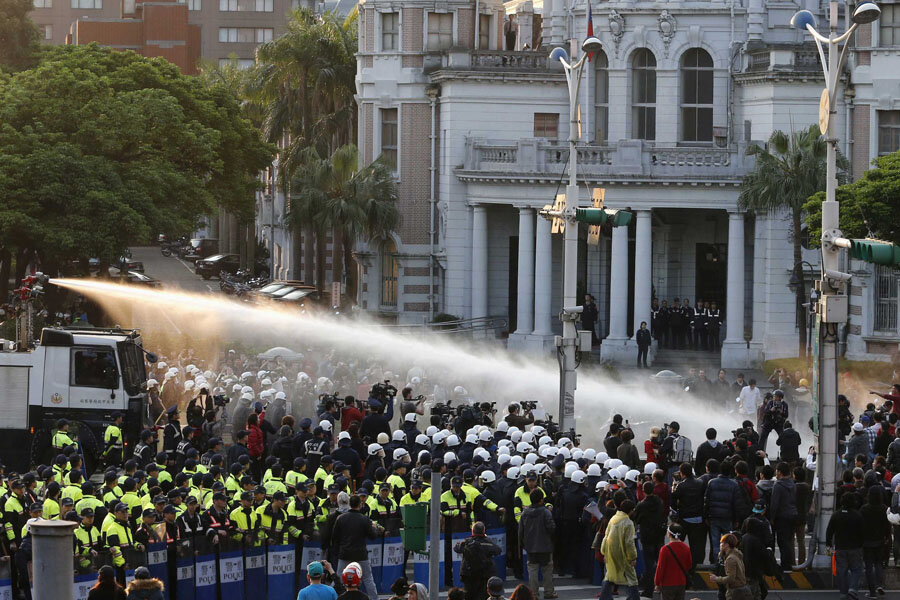Taiwan ejects protesters from government offices as frustration mounts
Loading...
| Taipei, Taiwan
Police in Taipei have forcibly ousted hundreds of demonstrators who had occupied the offices of senior government officials to protest a prized trade pact with China. That deal, a cornerstone of President Ma Ying-jeou's embrace of China, an economic powerhouse, may now face postponement.
Demonstrators retreated from the offices of cabinet leaders after a five-hour standoff with about 2,000 police officers, some of whom fired high-pressure water cannons. Students continue to occupy Taiwan's parliament which they forcibly entered last week in a major escalation of their campaign.
Monday's expulsion has hardened the resolve of participants who are demanding that the government scrap its service trade deal with China.
“We will not waver,” the protest group said in a statement Monday. “Against an undemocratic and autocratic government, we stand strong and we stand united.”
The backlash against the bill, which would liberalize investment and competition in dozens of service industries in both countries, is a stark challenge to President Ma, who took office in 2008 promising to improve ties with China after six decades of hostilities.
China and Taiwan held their first ministerial-level meeting in February and Ma has proposed a meeting with Chinese leader Xi Jinping, so far to no avail.
The uproar over the trade pact also gives momentum to Taiwan's opposition, which is allied to the student campaign, ahead of year-end local elections.
“We hope they can really listen to what we’re saying because this deal was about to be approved as law, yet their dialogue with the public has not been transparent,” says Simon Yang, a high-tech worker from central Taiwan who joined protesters outside parliament. “I’m pessimistic. I think the government will listen but not make any changes.”
China claims self-ruled Taiwan as part of its territory and insists that the two sides must eventually be reunified, a view that has limited support in Taiwan.
Parliament sit-in
The demonstrations began last Tuesday outside parliament. A small group of students broke into one of the main legislative chambers and have been live-streaming their occupation; tens of thousands took to the streets over the weekend in support of the students.
On Sunday night the movement expanded to the cabinet offices, a dramatic escalation that spurred a steelier response from the authorities. Just before midnight the premier ordered police to expel the intruders. Police arrested 61 and questioned 35 others.
The ouster did not extend to the larger group of students camped out at parliament. On Monday morning hundreds still slept or sat on cardboard box flaps or pieces of foam while supporters ordered breakfast delivery.
Protesters originally called for a line-by-line review of the service pact, which would open 80 service sectors in China and 64 in Taiwan. Yet striking or altering clauses from or in the agreement would require new negotiations with China, undermining Taiwan’s reputation as a trade partner.
Mr. Ma gave a news conference Sunday to defend the pact in its current form, but his remarks angered protesters, who now want the pact scrapped and reformulated.
The trade deal will probably be put on hold until after protests die down, says Hsu Yung-ming, political scientist at Soochow University in Taipei. That would crimp the ambitions of Taiwanese companies that are keen to expand in China, notably the island’s top banks.
But a deal is expected to pass eventually. Surveys by government and private agencies have found that most Taiwanese support liberalization, despite risks to smaller service companies that would be exposed to Chinese competition. Most other trade and economic deals with China approved since 2008 have drawn little opposition.
“The pact is good for Taiwan, but these disputes it seems to me are not going to be settled shortly, so the pact will be postponed,” says Liu Yi-jiun, public affairs professor with Fo Guang University in Taiwan. “I don’t see any chance Taiwan will exercise the option of a trade pact now.”






